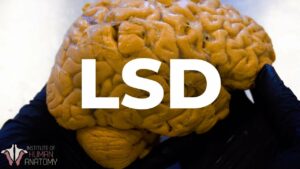In this video, the host discusses frontotemporal dementia (FTD), a condition that affects the frontal and temporal lobes of the brain. The recent revelation of actor Bruce Willis‘ diagnosis has brought attention to FTD. The video emphasizes the importance of understanding the principles of brain health and taking preventative measures. The main factors that contribute to FTD include fuel availability (glucose and ketones), oxygenation, and stimulation. Lifestyle choices such as a ketogenic diet, intermittent fasting, exercise, learning new skills, social engagement, and reducing inflammation and toxicity can potentially delay the onset or slow down the progression of FTD.

Our Summaries are written by our own AI Infrastructure, to save you time on your Health Journey!
Key Insights:
- Frontotemporal dementia affects the frontal and temporal lobes of the brain.
- Alzheimer’s primarily affects the temporal lobe, while frontotemporal dementia affects both the frontal and temporal lobes, resulting in early symptoms such as speech and motor function deterioration.
- To reduce the chances of developing dementia, it is essential to understand the factors that influence degeneration and take steps to improve brain health.
- Genetics play a role in most diseases, but lifestyle choices can also significantly impact the likelihood of developing dementia.
- Dementia is a degenerative disease that occurs when brain cells stop functioning properly.
- The brain requires fuel, oxygen, and stimulation to function optimally.
- Glucose can be a fuel source for the brain, but high levels of glucose can hinder fuel delivery, leading to brain degeneration.
- Exercise, movement, learning new skills, and maintaining a social network can provide the necessary stimulation for the brain to thrive.
- Inflammation, oxidative stress, and toxicity can interfere with brain function and contribute to degeneration.
- Prioritizing brain health through lifestyle changes, such as following a ketogenic diet, intermittent fasting, eliminating processed plant oils, and reducing sugar consumption, can help improve the odds of preventing or delaying the onset of dementia.
- Engaging in regular exercise, practicing meditation, and finding hobbies or activities that provide joy and purpose can also support brain health.
- Individuals should consider making these changes before symptoms appear or as early as possible to maximize their effectiveness.
Transcript
Hello Health Champions, today we’re going to talk about frontotemporal dementia, what it is, what you can do to prevent it, and also if there’s anything that you can do if you already have it. Frontotemporal Dementia, or FTD, became a hot topic very recently when the family of the famous actor Bruce Willis came forward and announced that he did have FTD. Earlier, they had believed that he had simply had aphasia, which means lack of speech, but then the disease had progressed and now he’d gotten the diagnosis of FTD. So, the family came forward in the hopes of bringing some attention to this devastating condition and maybe the hopes of bringing some light to it and some progress. My heart goes out to the family, and I applaud them in this effort. And not only is Bruce Willis one of my favorite actors of all time, but I even happen to look like him, some people say.
Unfortunately, when a celebrity gets a diagnosis or attention is drawn to a celebrity with a disease, we get a few days or a few weeks of attention on the topic, but by the time this happens, very often it’s too late to really do something about it. We’re going to talk about the different things and there’s still some things that may be able to help, but we really want to understand that we want to understand the principles and then do something about our lifestyle to reduce the chances. We want to work much, much harder at preventing these things because they’re not all that different. Most degeneration has things in common.
So frontotemporal dementia refers to the area in the brain that is being affected. So if we have the brain here, then the frontal lobe is the front half of it. With Alzheimer’s, it affects mostly the temporal lobe and the occipital lobe, so it’s further back in the brain. But with frontotemporal dementia, it affects the frontal and the temporal. The frontal lobe is the executive center of the brain, responsible for thinking, abstract thought, problem-solving, controlling impulses, motivation, and also known as the motor center. The temporal lobe is more concerned with memory. With Alzheimer’s, it’s mostly the memory that’s affected, but with frontotemporal dementia, both memory and the frontal lobe functions are affected.
Frontotemporal dementia is the most common form of dementia for people under the age of 60. It has a strong genetic component, and there is also a lifestyle component. In the case of congenital conditions, there’s nothing you can do with lifestyle to prevent them. But most diseases have lifestyle components, and there are things you can do to improve the quality of life and potentially delay the onset of the disease.
The main characteristic of dementia is that it is a degenerative disease. Brain cells need fuel, oxygen, and stimulation to function properly. Glucose and ketones are the fuels for the brain. Glucose is commonly thought to be the primary fuel source, but high levels of glucose actually decrease the availability of fuel for the brain, leading to insulin resistance. Ketones, on the other hand, are a more stable and anti-inflammatory fuel source that can freely enter the cells without requiring insulin.
Oxygen is needed to oxidize the fuel and produce energy. Poor circulation, stress, lung diseases, heart problems, and anemia can all decrease oxygen availability to the brain.
Stimulation is necessary for brain cells to stay alive and functional. Movement and exercise, learning new skills, social interactions, hobbies, and mental activities like reading and meditation all provide stimulation for the brain. Lack of stimulation can lead to brain degeneration.
Inflammation, oxidative stress, and toxicity are metabolic factors that can interfere with brain function and contribute to degeneration. Sugar, processed plant oils, pesticides, metals, and chemical exposure are all potential sources of inflammation, oxidative stress, and toxicity.
To prevent or delay the onset of frontotemporal dementia, it is recommended to adopt a healthy lifestyle. This includes cutting out sugar and reducing carbohydrates, especially if insulin resistant. A ketogenic diet and intermittent fasting can provide alternative fuel sources for the brain and reduce insulin resistance. Exercise, both physical and mental, is important for brain health. Avoiding processed plant oils and replacing them with natural fats is also beneficial.
It is important to make lifestyle changes before the onset of symptoms or in the early stages of the disease. However, even in later stages, some changes can still be effective in slowing down the progression of the disease.
Overall, understanding the principles of brain health and taking proactive steps to improve lifestyle and reduce risk factors can help reduce the chances of developing frontotemporal dementia or delay its onset.





